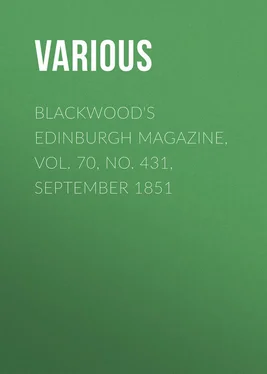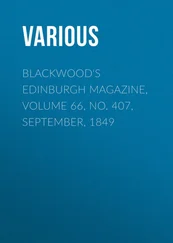Various - Blackwood's Edinburgh Magazine, Vol. 70, No. 431, September 1851
Здесь есть возможность читать онлайн «Various - Blackwood's Edinburgh Magazine, Vol. 70, No. 431, September 1851» — ознакомительный отрывок электронной книги совершенно бесплатно, а после прочтения отрывка купить полную версию. В некоторых случаях можно слушать аудио, скачать через торрент в формате fb2 и присутствует краткое содержание. Издательство: Иностранный паблик, Жанр: periodic, foreign_edu, Путешествия и география, на английском языке. Описание произведения, (предисловие) а так же отзывы посетителей доступны на портале библиотеки ЛибКат.
- Название:Blackwood's Edinburgh Magazine, Vol. 70, No. 431, September 1851
- Автор:
- Издательство:Иностранный паблик
- Жанр:
- Год:неизвестен
- ISBN:нет данных
- Рейтинг книги:3 / 5. Голосов: 1
-
Избранное:Добавить в избранное
- Отзывы:
-
Ваша оценка:
- 60
- 1
- 2
- 3
- 4
- 5
Blackwood's Edinburgh Magazine, Vol. 70, No. 431, September 1851: краткое содержание, описание и аннотация
Предлагаем к чтению аннотацию, описание, краткое содержание или предисловие (зависит от того, что написал сам автор книги «Blackwood's Edinburgh Magazine, Vol. 70, No. 431, September 1851»). Если вы не нашли необходимую информацию о книге — напишите в комментариях, мы постараемся отыскать её.
Blackwood's Edinburgh Magazine, Vol. 70, No. 431, September 1851 — читать онлайн ознакомительный отрывок
Ниже представлен текст книги, разбитый по страницам. Система сохранения места последней прочитанной страницы, позволяет с удобством читать онлайн бесплатно книгу «Blackwood's Edinburgh Magazine, Vol. 70, No. 431, September 1851», без необходимости каждый раз заново искать на чём Вы остановились. Поставьте закладку, и сможете в любой момент перейти на страницу, на которой закончили чтение.
Интервал:
Закладка:
Mr Werne's book is a journal, written daily during the campaign but, owing to the long interval between its writing and publication, he has found it necessary to make frequent parenthetical additions, corrective or explanatory. Towards the end of April, during great sickness in camp, he writes as follows: – "My brother's medical observations and experiments begin to excite in me a strong interest. He has promised me that he will keep a medical journal; but he must first get into better health, for now it is always with sickening disgust that he returns from visiting his patients; he complains of the insupportable effluvia from these people, sinks upon his angarèb with depression depicted in his features, and falls asleep with open eyes, so that I often feel quite uneasy." Then comes the parenthesis of ten years' later date. "Subsequently, when I had joined the expedition for the navigation of the White Nile, he wrote to me from the camp of Kàssela-el-Lus to Chartum, that, with great diligence and industry, he had written some valuable papers on African diseases, and was inconsolable at having lost them. He had been for ten days dangerously ill, had missed me sadly, and, in a fit of delirium, when his servant asked him for paper to light the fire, had handed him his manuscript, which the stupid fellow had forthwith burned. At the same time, he lamented that, during his illness, our little menagerie had been starved to death. The Bascha had been to see him, and by his order Topschi Baschi had taken charge of his money, that he might not be robbed, giving the servants what was needful for their keep, and for the purchase of flesh for the animals. The servants had drunk the money intended for the beasts' food. When my brother recovered his health, he had the fagged , (a sort of lynx,) which had held out longest, and was only just dead, cut open, and so convinced himself that it had died of hunger. The annoyance one has to endure from these people is beyond conception, and the very mildest-tempered man – as, for instance, my late brother – is compelled at times to make use of the whip."
Whilst Mohammed Din and the other Shechs, accompanied by detachments of Turkish troops, intended partly to support them in their demands, and partly to reconnoitre the country, endeavoured to get together the stipulated tribute, the army remained stationary. But repose did not entail monotony; strange incidents were of daily occurrence in this singular camp. The Wernes, always anxious for the increase of their cabinet of stuffed birds and beasts, sent their huntsman Abdallah with one of the detachments, remaining themselves, for the present at least, at headquarters, to collect whatever might come in their way. The commander of the Mograbins sent them an antelope as big as a donkey, having legs like a cow, and black twisted horns. From the natives little was to be obtained. They were very shy and ill-disposed, and could not be prevailed upon, even by tenfold payment, to supply the things most abundant with them, as for instance milk and honey. In hopes of alluring and conciliating them, the Bascha ordered those traders who had accompanied the army to establish a bazaar outside the fence enclosing the camp. The little mirrors that were there sold proved a great attraction. The Arabs would sit for whole days looking in them, and pulling faces. But no amount of reflection could render them amicable or honest: they continued to steal camels and asses whenever they could, and one of them caught a Schaigie's horse, led him up to the camp, and stabbed him to death. So great was the hatred of these tribes to their oppressors – a hatred which would have shown itself by graver aggressions, but for Achmet's large force, and above all, for their dread of firearms. Within the camp there was wild work enough at times. The good-hearted, hot-headed Werne was horribly scandalised by the ill-treatment of the slaves. Dumont, the French apothecary, had a poor lad named Amber, a mere boy, willing and industrious, whom he continually beat and kicked, until at last Mr Werne challenged him to a duel with sabres, and threatened to take away the slave, which he, as a Frenchman, had no legal right to possess. But this was nothing compared to the cruelties practised by other Europeans, and especially at Chartum by one Vigoureux, (a French corporal who had served under Napoleon, and was now adjutant of an Egyptian battalion,) and his wife, upon a poor black girl, only ten years of age, whom they first barbarously flogged, and then tied to a post, with her bleeding back exposed to the broiling sun. Informed of this atrocity by his brother, who had witnessed it, Mr Werne sprang from his sickbed, and flew to the rescue, armed with his sabre, and with a well-known iron stick, ten pounds in weight, which had earned him the nickname of Abu-Nabut, or Father of the Stick. A distant view of his incensed countenance sufficed, and the Frenchman, cowardly as cruel, hastened to release his victim, and to humble himself before her humane champion. Concerning this corporal and his dame, whom he had been to France to fetch, and who was brought to bed on camel-back, under a burning sun, in the midst of the desert, some curious reminiscences are set down in the Feldzug , as are also some diverting details of the improprieties of the dissipated gunner Topschi Baschi, who, on the 1st May, brought dancing-girls into the hut occupied by the two Germans, and assembled a mob round it by the indecorous nature of his proceedings. Regulations for the internal order and security of the camp were unheard of. After a time, tents were pitched over the ammunition; a ditch was dug around it, and strict orders were given to light no fire in its vicinity. All fires, too, by command of the Bascha, were to be extinguished when the evening gun was fired. For a short time the orders were obeyed; then they were forgotten; fires were seen blazing late at night, and within fifteen paces of the powder. Nothing but the bastinado could give memory to these reckless fatalists. "I have often met ships upon the Nile, so laden with straw that there was scarcely room for the sailors to work the vessel. No matter for that; in the midst of the straw a mighty kitchen-fire was merrily blazing."
On the 6th of May, the two Wernes mounted their dromedaries and set off, attended by one servant, and with a guide provided by Mohammed Defalla, for the village of El Soffra, at a distance of two and a half leagues, where they expected to find Mohammed Din and a large assemblage of his tribe. It was rather a daring thing to advance thus unescorted into the land of the treacherous Haddendas, and the Bascha gave his consent unwillingly; but Mussa, (Moses,) the Din's only son, was hostage in the camp, and they deemed themselves safer alone than with the half company of soldiers Achmet wanted to send with them. Their route lay due east, at first through fields of durra , (a sort of grain,) afterwards through forests of saplings. The natives they met greeted them courteously, and they reached El Soffra without molestation, but there learned, to their considerable annoyance, that Mohammed Din had gone two leagues and a half farther, to the camp of his nephew Shech Mussa, at Mitkenàb. So, after a short pause, they again mounted their camels, and rode off, loaded with maledictions by the Arabs, because they would not remain and supply them with medicine, although the same Arabs refused to requite the drugs with so much as a cup of milk. They rode for more than half an hour before emerging from the straggling village, which was composed of wretched huts made of palm-mats, having an earthen cooking-vessel, a leathern water-bottle, and two stones for bruising corn, for sole furniture. The scanty dress of the people – some of the men had nothing but a leathern apron round their hips, and a sheep-skin, with the wool inwards, over their shoulders – their long hair and wild countenances, gave them the appearance of thorough savages. In the middle of every village was an open place, where the children played stark naked in the burning sun, their colour and their extraordinarily nimble movements combining, says Mr Werne, to give them the appearance of a troop of young imps. Infants, which in Europe would lie helpless in the cradle, are there seen rolling in the sand, with none to mind them, and playing with the young goats and other domestic animals. In that torrid climate, the development of the human frame is wonderfully rapid. Those women of whom the travellers caught a sight in this large village, which consisted of upwards of two thousand huts and tents, were nearly all old and ugly. The young ones, when they by chance encountered the strangers, covered their faces, and ran away. On the road to Mitkenàb, however, some young and rather handsome girls showed themselves. "They all looked at us with great wonder," says Mr Werne, "and took us for Turks, for we are the first Franks who have come into this country."
Читать дальшеИнтервал:
Закладка:
Похожие книги на «Blackwood's Edinburgh Magazine, Vol. 70, No. 431, September 1851»
Представляем Вашему вниманию похожие книги на «Blackwood's Edinburgh Magazine, Vol. 70, No. 431, September 1851» списком для выбора. Мы отобрали схожую по названию и смыслу литературу в надежде предоставить читателям больше вариантов отыскать новые, интересные, ещё непрочитанные произведения.
Обсуждение, отзывы о книге «Blackwood's Edinburgh Magazine, Vol. 70, No. 431, September 1851» и просто собственные мнения читателей. Оставьте ваши комментарии, напишите, что Вы думаете о произведении, его смысле или главных героях. Укажите что конкретно понравилось, а что нет, и почему Вы так считаете.












